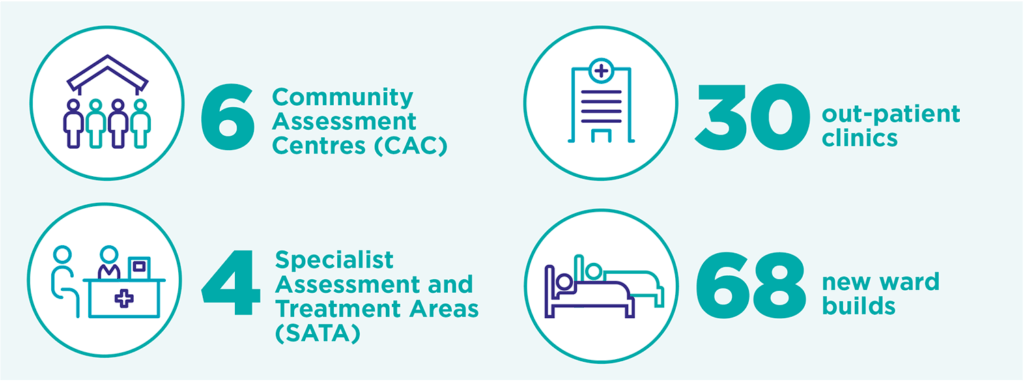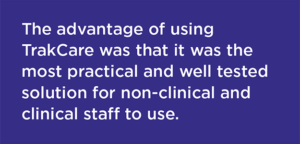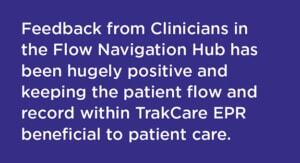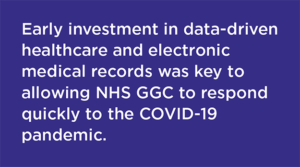Early investment in data-informed healthcare put NHS Greater Glasgow and Clyde (GGC) ahead in the race to respond — and kept it there
Author - Denise Brown, Head of eHealth Strategy & Programmes, eHealth Directorate, NHS Greater Glasgow & Clyde, Scotland
The pandemic has undoubtedly been a challenge for health and care across the country. At NHS Greater Glasgow and Clyde (GGC), we were fortunate enough to have adopted a data-driven and digital-first approach to healthcare delivery all the way back in 2010. When the pandemic hit, this made it easier for us to reconfigure our plans at speed to meet expected volumes, create new treatment pathways and integrate Primary Care and other services into a comprehensive response.
Laying the ground through digital transformation
NHS GGC serves 1.14 million people and employs 39,000 staff, making it one of the largest healthcare providers in Europe.
In 2010 GGC implemented the InterSystems TrakCare electronic patient management system.
TrakCare functions as an electronic patient management system (PMS) for acute services within the Board, feeding the wider Electronic Health and Care System (EHCR).

The system has enabled clinicians to manage patients on COVID and non COVID pathways during the pandemic, providing visibility of essential data across all areas. InterSystems developed the alert functionality in TrakCare which interfaced to the Board’s infection control system. Any patients with a COVID positive result immediately had an alert created on their record. This alert was visible on TrakCare floorplans making it easy to identify patients on the COVID pathway.
Using the capability
The need to respond quickly was critical, there was an immediate need to implement digital support across a number of areas. Using existing TrakCare functionality we set up six Community Assessment Centres (CAC) and four Specialist Assessment and Treatment Areas (SATA) with patients with COVID-19 symptoms initially triaged by phone. We created, within a very short space of time, 30 out-patient clinics to support the CACs, 68 new ward builds, and amended intensive-care unit (ICU) beds floor plans to accommodation the increase in beds.


Staff in the CACs were quickly set up with InterSystems TrakCare as a way of co-ordinating the patient journey between the CAC, hospitals and other facilities. The advantage of using TrakCare was that it was the most practical and well tested solution for non-clinical and clinical staff to use. In addition GP staff working in the CACs used TrakCare to record clinic outcomes and place laboratory requests using TrakCare Order Comms and Workbench functionality for non-laboratory requests. Between March 2020 and April 2020 1,602,255 results were received in TrakCare and 16,617 workbench requests made.
We extended the system to NHS Louisa Jordan implemented in Glasgow’s Scottish Events Campus (SEC) in a matter of weeks.
As teams expanded, even those who were doing work that was new to them, in often highly pressured environments, could use TrakCare to keep clinical records up to date and moving through the system with each patient.

Using TrakCare, NHS staff managed workflows and patient treatment pathways from initial diagnosis right through to discharge. It also gave the staff the data and tools they needed to identify patients with significant comorbidities.
And because data was updated in real time, we were able to continually update our business and analytics dashboards with new data from which to draw insights. This was crucial in being able to respond to a rapidly changing situation.
The most recent development in TrakCare has been in support of the Scottish Government’s Redesign of Urgent Care. TrakCare is being used to manage the flow of electronic referrals from NHS 24 to the Board’s Flow Navigation Hub using standard functionality such as Quick Book Clinics, ED Module and some new functionality called Active Clinical Notes (ACN). ACN allows clinicians to electronically capture ED clinical notes from a virtual

consultation, these electronic notes are then incorporated into the TrakCare ED Discharge Letters and sent back to GPs via an electronic feed. These notes are also added to the TrakCare EPR meaning they are visible should the patient require to be admitted to ED or referred to another service. Feedback from Clinicians in the Flow Navigation Hub has been hugely positive and keeping the patient flow and record within TrakCare EPR beneficial to patient care.
The reaction from patients to the increased prominence of digital and tele-healthcare has been positive, as has the response within the health board. At the start of the pandemic, GP Practices were equipped with the necessary technology to enable them to carry out remote video consultations. There’s been a recognition that the capabilities we’ve introduced have been helpful and that they need to continue to be scaled up.
What does this mean for the future of healthcare in Glasgow?
Early investment in data-driven healthcare and electronic medical records was key to allowing NHS GGC to respond quickly to the COVID-19 pandemic.
From my experience I know that this digital transformation relies on finding specialists with the right technical, strategic and data skills to guide your organisation through its digital transformation. Sometimes, these specialists must be in-house. It’s important that we continue to work with suppliers in partnership to help achieve our goals.
Working with InterSystems enabled NHS GGC to martial the skills and the technology we

needed to respond to COVID-19, at speed. The way InterSystems has supported us has demonstrated incredible effort, professionalism and expertise - all of which contributed greatly to helping GGC to respond to the pandemic so rapidly. In fact, I’d like to mention Suzanne McLaughlin especially, because it’s so important to say thank you to your colleagues at times like this – when you need strong relationships and mutual good will.

























